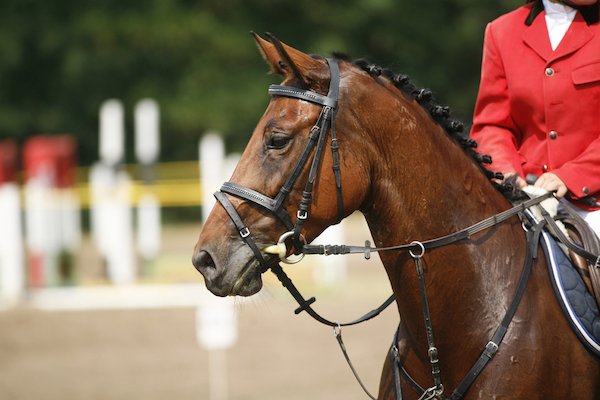
[dropcap]W[/dropcap]e all experience stress to some degree, and our horses are no different. A little stress can be a good thing if it is channelled in a positive way, but too much may cause distress, particularly in the horse who has a ‘fight or flight’ coping mechanism. Stress results in a high level of energy in the muscles, increasing the body’s ability to physically react while lowering the brain’s capacity to think. Horses don’t have the ability to reason and understand the cause of their anxiety, and this can result in behavioural problems, which can further escalate at shows.
Initial stress

Whether you ride professionally or recreationally, competing is stressful for both horse and rider. Horses are creatures of habit and stress can arise from travelling, finding themselves at a new venue, a change of routine, and the competition itself. Often the excitement of being at a show means horses don’t eat or drink enough, which can impact their digestive system and increase the risk of ulcers or impaction colic. It is important to find a quiet place to stand your horse between classes and ensure that he has a full hay net and bucket of water. The water at different venues might taste strange to a fussy drinker, and it sometimes works to put a little molasses in his water at home and away, so that it always tastes the same. It is also a good idea to give electrolytes.
Preparing an inexperienced horse
In the case of an inexperienced horse, or a horse who has never been to a show, it’s likely that his first show away from home will be exciting and potentially stressful. Luckily, there are a couple of things you can do from home to prepare your horse for a future show. Start with loading, unloading and going on short drives to ensure he is comfortable in a horsebox. The more the show environment reflects things that are familiar at home, the more relaxed the horse will be. Expose him to music and loudspeakers, set up flags and umbrellas, and get your friends to cheer and clap on the edge of the arena. Have a group lesson and get him used to having horses coming towards or up behind him. If you are planning to jump at the show, try exposing your horse to spooky fillers and colourful poles. Some dressage and showjumping venues also put pot plants on either side of the jumps, or at the dressage letters, so let your horse have a look at those too. If you are planning to go to an indoor show venue, book a practice session in a covered arena to get the horse used to the indoor environment. If you are able to, ask a show venue if you can pay a ground levy and come ride your horse in their arenas. Even if it’s not busy, it’s an opportunity for your horse to experience being ridden away from home.
On the day

Make sure you allow for enough time, on arrival at the venue, to give your horse a chance to settle. Walk him around, either under saddle or in hand, getting him used to the sights, sounds and smells of the show. Understanding his disposition means that you’ll be able to gauge his mood and react accordingly. When you warm up in preparation for your class, keep your horse on your aids so that his attention is on you rather than external distractions. Ride your horse forward into your hands so that you always have a connection. Keeping a steady rhythm should relax a nervous horse. It can help to lunge a very excitable horse before getting on, provided that there is an appropriate space and that you’re not upsetting any of the other competitors. However, don’t overdo it!
When that doesn’t work
Despite your best efforts, your horse may still find the atmosphere at shows stressful. In this case, consider a calming supplement such as Pharmacalm, which is highly effective in reducing stress levels without blunting the competitive edge. It is available as a paste, to be administered before an event, as well as a daily food supplement. Speak to your vet or visit your local tack shop to see what other options are available. Most horse food brands also offer calming options that provide cool energy, so a change in feed may be another option.
The full article appears in the April issue of HQ
Text: Jan Tucker

